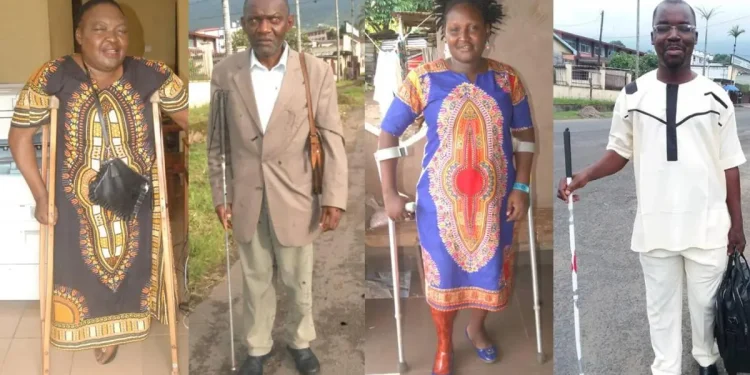Conflict casts a dark shadow over the lives, health, and safety of all individuals, but for persons with disabilities residing in war zones, the challenges are compounded. In the North West Region, the impact of the armed conflict is especially severe for people with disabilities.
“I have been saved by Grace since 2016 when the war began,” said Amanboh, a 19-year-old student with a hearing impairment.
Through a sign language interpreter, Amanboh recounts an incident during which violence erupted around her, leaving her unable to hear anything due to the lack of an assistive device. “I was on my way home from school when suddenly, at the Hospital Roundabout where a headless body had been dropped, I saw people running in different directions. I could not hear anything, so I didn’t know where to run,” said Amanboh.
Despite the heavy gunfire, Amanboh, aware of the danger, could not determine its direction due to her hearing impairment.
In 2018, Pa Neba, visually impaired, was abandoned by his family during their displacement from Bafut. “I could not run since I cannot see. I asked my wife to run for safety with our children, knowing I would be killed since I did not know whether I was running into or out of danger,” recounts Pa Neba. After many weeks, he reunited with his family.
“We thought he had been killed judging from the crossfire we went through to reach Bamenda, but thank God he is here,” said Sirri, his eldest daughter.
In 2023, a hearing-impaired boy in Big Babanki was killed because soldiers mistakenly thought he was ignoring them, not realising he could not hear them. In 2018, a man in a wheelchair suffered burns when their house was set ablaze.
The armed conflict has placed an immense strain on persons with disabilities. Nde Vitalis, the protection officer at the Coordinating Unit of Associations of Persons with Disabilities, remarks, “We persons with disabilities have gone through unspeakable situations that have left us with permanent scars that even time cannot erase.”
Double Challenged During Conflict
Nseh (not his real name), blind for over 25 years, faces discrimination while trying to make ends meet. Mistaken for a “terrorist,” Nseh was told to stay home and wait for food when he was about to purchase groceries.
Through a sign language interpreter, Amanboh reveals that she has been violently stopped and accused of pretending because she cannot hear security forces, who, in turn, cannot understand sign language.
“We face rejection from family and communities despite having abilities within our disabilities,” added Nde.
What’s Next for Persons with Disabilities
As the world observes the International Day for Persons with Disabilities on December 3, Nde Vitalis believes it is an opportunity for the government to adopt universal design principles for constructing public buildings, ensuring accessibility for all.
“Without an inclusive society, we will continue to depend,” emphasises Nde.
Nde also notes that over eleven thousand PWDs in the North West region feel excluded from public communication. “We depend on second-hand information. When there is no signing, no transcription, we persons with disabilities rely on hearsay for public information,” he adds.
At the Coordinating Unit of Associations of Persons with Disabilities, an organisation bringing together various PWD associations, advocacy campaigns are underway to showcase the abilities within their disabilities.



